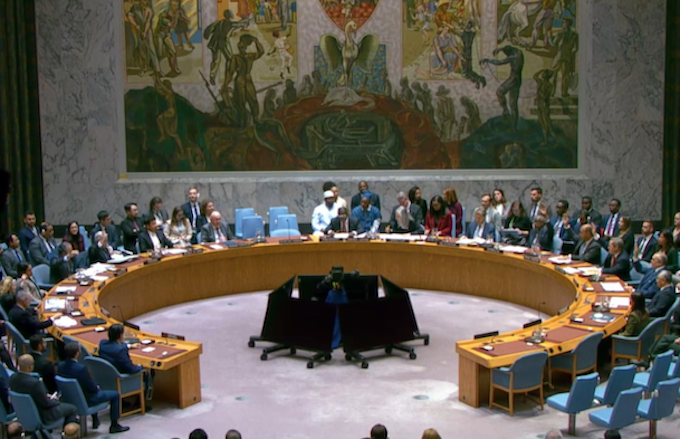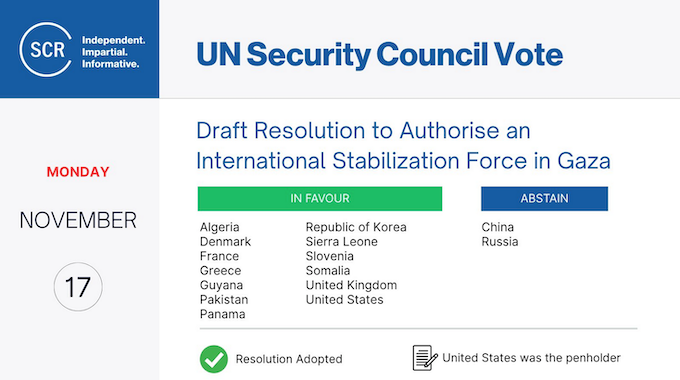
Asia Pacific Report
Israel and the US are now dictating their terms over Palestine, and Hamas and various Arab partners are at the receiving end of this diktat, says Al Jazeera’s senior political analyst Marwan Bishara.
Talking to Al Jazeera from Paris, Bishara said that the UN Security Council vote for a resolution endorsing President Donald Trump’s 20-point Gaza peace plan gave control to the US and Israel.
Within this context of power, hegemony, the US would be dictating the nature of the Board of Peace and the multinational Gaza stabilisation force.
- READ MORE: UN Security Council passes US resolution backing international Gaza force
- Other Gaza reports
The UN Security Council gained 13-0 votes, opening the way for the crucial next steps for the fragile ceasefire between Israel and Hamas.
However, both China and Russia were highly critical and abstained, citing the vague details of the resolution.
Russia had also circulated a rival resolution stressing that the occupied West Bank and Gaza must be joined as a contiguous state under the Palestinian Authority and underlining the importance of a Security Council role to provide security in Gaza and for implementing the ceasefire.
Bishara said that the stabilisation force would be from countries friendly to Israel and the US.
‘Complicated job’
“And that means their job is not just going to be to keep the peace on the borders but to also find a way to disarm Hamas,” he said.
“I think that’s going to be a complicated job because that also involves Israel acting on its own commitments, which means withdrawing to a narrow corridor on the eastern part of Gaza and so on.
“All of this will be very difficult to implement.”
Bishara said the US would be involved but only from the outside.
“The US doesn’t want to get involved in terms of troops or money. But those countries who are going to contribute soldiers and money, they are going to need guarantees – in terms of a safe passage forward in relation to Hamas.
“This is really important.”

Bishara said no Arab or Muslim-majority country wanted to be put in a position — even under pressure — of doing Israel’s bidding in Gaza or “doing Israel’s dirty work because Israel failed”.
“After two years of genocide, of killing tens of thousands of people, it failed to disarm Hamas directly on the battlefield.”
‘Important step’
A spokesperson for UN Secretary-General Antonio Guterres described the Gaza resolution as “an important step in the consolidation of the ceasefire” and called for the diplomatic momentum to be translated into “concrete and urgently needed steps on the ground”.
Stephane Dujarric said the UN was committed to its role in implementing the US resolution, including “scaling up humanitarian assistance” in Gaza and “supporting all efforts to move the parties toward the next phase of the ceasefire”.
He also said Guterres “commends the continued diplomatic efforts of Egypt, Qatar, Turkiye, the United States and regional states”.
The secretary-general also “underlines the importance of moving to the next phase of the US plan, leading to a political process for the achievement of the two-state solution in line with previous United Nations resolutions,” he added.
However, the Russian ambassador said this was no day of celebration for the Security Council, and he added thatthe integrity of the council was now in question.
The Chinese ambassador said the resolution that was adopted was vague and unclear.
‘Day of shame for UN’
Craig Mokhiber, a former senior UN human rights official, described the vote as a “day of shame for the United Nations”.
“Not a single member of the Council had the courage, principle, or respect for international law to vote against this US-Israel colonial outrage,” Mokhiber said in a post on X.
“This proposal has been rejected by Palestinian civil society and factions, and defenders of human rights and international law everywhere,” he said, adding that the “struggle for Palestinian freedom will continue”.
Mokhiber was the former director of the New York Office of the UN High Commissioner for Human Rights and left his post in 2023 in protest over the UN’s failure to prevent Israel’s genocide in Gaza.
The UN Security Council has just adopted the horrific US resolution with 13 yes votes and 2 abstentions. Not a single member of the Council had the courage, principle, or respect for international law to vote against this US-Israel colonial outrage. This proposal has been…
— Craig Mokhiber (@CraigMokhiber) November 17, 2025
The Algerian ambassador, who voted for the resolution, warned that it was explicit against Israeli annexation, and forced displacement.
Ambassador Amar Bendjama said his country was particularly grateful to Trump “whose personal engagement has been instrumental in establishing and maintaining the ceasefire in Gaza”, which ended almost two years of “unbearable suffering” for the Palestinians.
“But we underline that genuine peace in the Middle East cannot be achieved without justice, justice for the Palestinians who have waited for decades for the establishment of their independent state,” he said.
Bendjama also said the resolution needed to be read in its entirety.
“It clearly affirms no annexation, no occupation, no forced displacement,” he said.
He went on to say that humanitarian aid must be distributed in Gaza “without interference” from Israel.












































